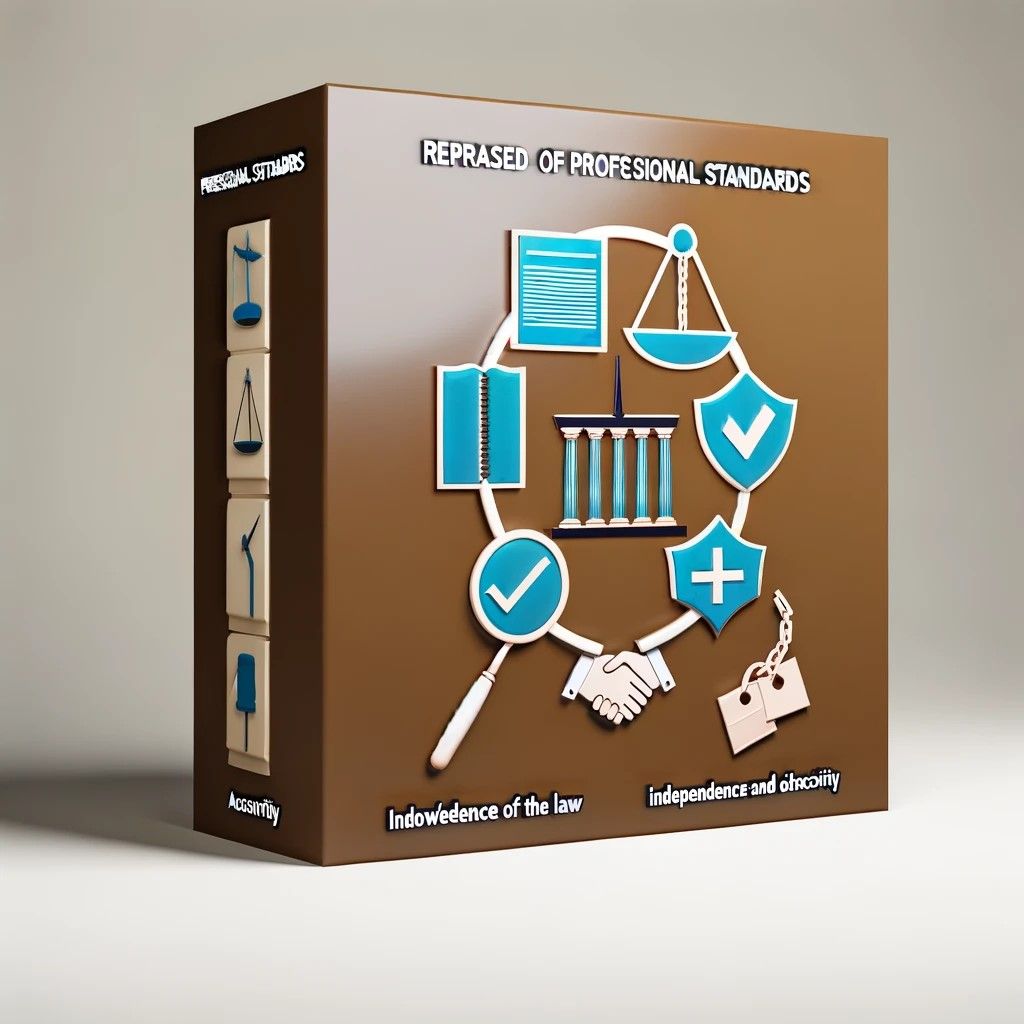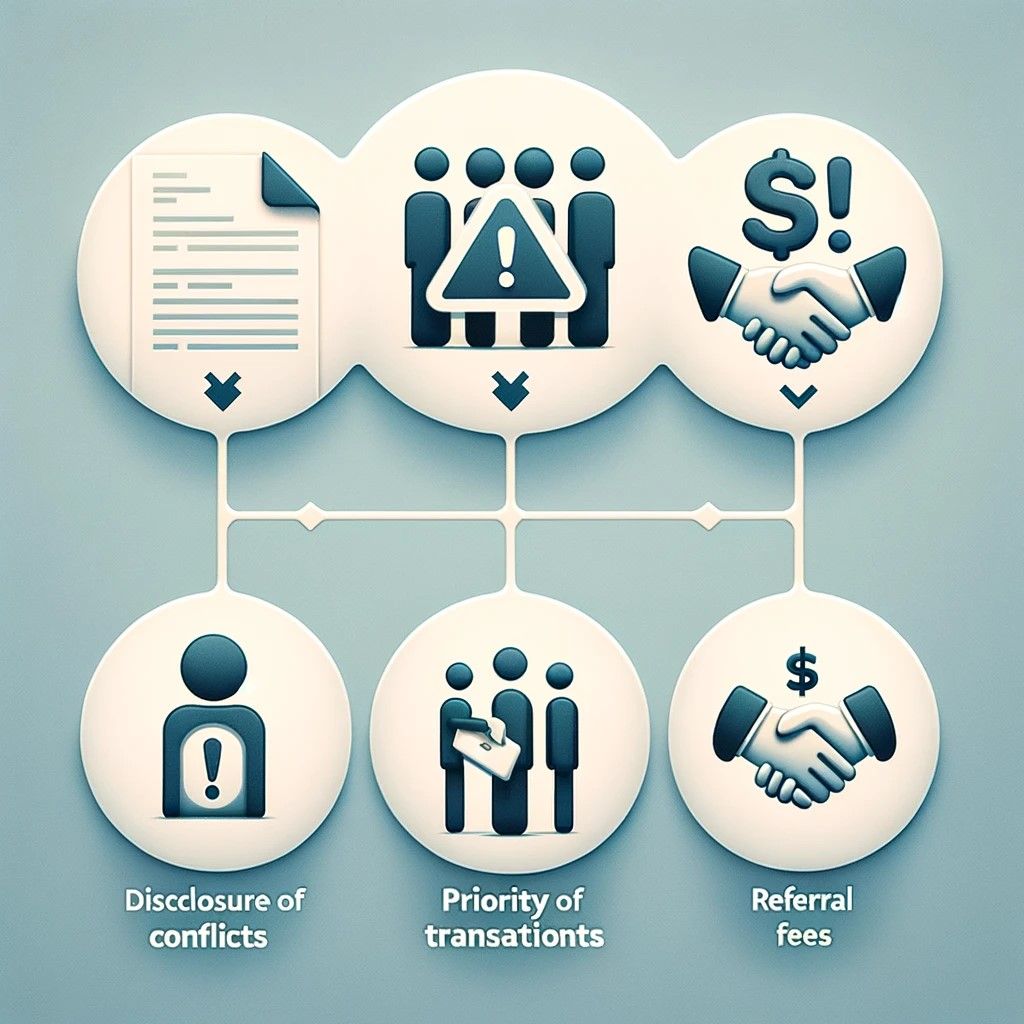The Code Of Ethics in Capital Academy
Protect your reputation, your firm, the profession—and most important, the public we serve.
To Accept Our Code Of Ethics Click Bellow
Accept Our Ethics
CAPITAL ACADEMY As the certifying body for the Chartered Portfolio And Fund Manage , Chartered Capital Market Advisor, and Chartered Digital Wealth manager certifications, CA requires every designee to adhere to these core ethical principles.
Alignment with these principles is a testament to the commitment of CAPITAL ACADEMY Charterholders to their clients , and to their trustworthinessSignify to the world that CAPITAL ACADEMY Charterholders adhere to a higher standard of ethics and professionalism,Elevate the integrity, knowledge, skills, and value of CAPITAL ACADEMY certificants,
Code of Ethics
Standards of Professional Conduct
Honor Pledge
Complaints and Disciplinary Actions
Reliabilit Of
Capital Academy
Capital Academy
Professional Standard means
Obligations
To Clients
To Clients
Obligations
To Employer
To Employer
INVESTMENT EXAMINATION,RECOMMENDATIONS
Conflicts of
Interestet
Interestet

A.Knowledge of the Law:
Members and candidates must be familiar with and adhere to all relevant laws, rules, and regulations from any governing body, regulatory organization, licensing agency, or professional association that oversees their professional activities. In cases where there is a conflict, the stricter law, rule, or regulation should be followed. Members and candidates should not knowingly participate in or support any violation of these laws, rules, or regulations and must distance themselves from any such violations.
B.Independence and Objectivity:
Members and candidates must exercise reasonable care and judgment to maintain their independence and objectivity in professional activities. They must not offer, solicit, or accept any gifts, benefits, compensation, or any other consideration that could reasonably be expected to compromise their own or another's independence and objectivity.
C.Accuracy:
Members and candidates must not intentionally make any false statements or misrepresentations related to investment analysis, recommendations, actions, or other professional activities.
D.Integrity:
Members and candidates must avoid engaging in any professional conduct involving dishonesty, fraud, or deceit and must refrain from any actions that could negatively impact their professional reputation, integrity, or competence.
Members and candidates must be familiar with and adhere to all relevant laws, rules, and regulations from any governing body, regulatory organization, licensing agency, or professional association that oversees their professional activities. In cases where there is a conflict, the stricter law, rule, or regulation should be followed. Members and candidates should not knowingly participate in or support any violation of these laws, rules, or regulations and must distance themselves from any such violations.
B.Independence and Objectivity:
Members and candidates must exercise reasonable care and judgment to maintain their independence and objectivity in professional activities. They must not offer, solicit, or accept any gifts, benefits, compensation, or any other consideration that could reasonably be expected to compromise their own or another's independence and objectivity.
C.Accuracy:
Members and candidates must not intentionally make any false statements or misrepresentations related to investment analysis, recommendations, actions, or other professional activities.
D.Integrity:
Members and candidates must avoid engaging in any professional conduct involving dishonesty, fraud, or deceit and must refrain from any actions that could negatively impact their professional reputation, integrity, or competence.

A.Loyalty, Prudence, and Care:
Members and candidates must demonstrate loyalty to their clients, act with reasonable care, and exercise prudent judgment. They must prioritize their clients' interests over those of their employer or themselves.
Members and candidates must demonstrate loyalty to their clients, act with reasonable care, and exercise prudent judgment. They must prioritize their clients' interests over those of their employer or themselves.
B.Fair Dealing:
Members and candidates must treat all clients fairly and objectively when providing investment analysis, making investment recommendations, taking investment action, or engaging in other professional activities.
Members and candidates must treat all clients fairly and objectively when providing investment analysis, making investment recommendations, taking investment action, or engaging in other professional activities.
Standards of Professional Conduct
C.Suitability:
.For advisory relationships with clients:
-Nondiscrimination:
Counselors respect diversity and must not discriminate against clients based on age, color, culture, disability, ethnic group, gender, race, religion, sexual orientation, marital status, or socio-economic status.
-Nondiscrimination:
Counselors respect diversity and must not discriminate against clients based on age, color, culture, disability, ethnic group, gender, race, religion, sexual orientation, marital status, or socio-economic status.
-Disclosure to Clients:
Counselors must adequately inform clients, preferably in writing, regarding the counseling process and relationship at or before the first meeting and throughout the relationship.
Counselors must adequately inform clients, preferably in writing, regarding the counseling process and relationship at or before the first meeting and throughout the relationship.
-Advance Understanding of Fees:
Counselors must explain to clients, prior to entering the counseling relationship, the financial arrangements related to professional services.
-Conduct a reasonable inquiry into the client's or prospective client's investment experience,risk and return objectives, and financial constraints before making any investment recommendation or taking investment action, and regularly reassess and update this information.
-Ensure that investments are suitable for the client's financial situation and aligned with their written objectives, mandates, and constraints before making recommendations or taking actions.
-Evaluate the suitability of investments in the context of the client's overall portfolio.
.For managing a portfolio according to a specific mandate, strategy, or style:
-Make only investment recommendations or take only actions that align with the stated objectives and constraints of the portfolio.
-Performance Reporting: When presenting investment performance information, members and candidates must strive to ensure that it is fair, accurate, and complete.
D.Confidentiality:
Members and candidates must keep information about current, former, and prospective clients confidential unless:
-The information concerns illegal activities by the client or prospective client,
-Disclosure is required by law,
-The client or prospective client consents to the disclosure
Data Disguise Required:
Counselors must disguise the identity of the client when using data for training, research, or publication. The survey must also contain a written disclosure statement concerning privacy at the beginning of a survey.

Acting In the Client’s Best Interest ,Maintain a high level of ethical conduct.
This is the cardinal principle of CAPITAL ACADEMY Code of Professional Responsibility
A.Confidential Information:
Members and candidates who have access to important, undisclosed information that could impact the value of an investment must not act on it or encourage others to do so
Members and candidates who have access to important, undisclosed information that could impact the value of an investment must not act on it or encourage others to do so
B.Market Manipulation:
Members and candidates must refrain from activities that manipulate prices or artificially increase trading volume with the intent to deceive market participants.
Members and candidates must refrain from activities that manipulate prices or artificially increase trading volume with the intent to deceive market participants.

A.Trustworthiness:
In employment-related matters, members and candidates must act in their employer's best interests. They should not deprive their employer of the benefits of their skills and abilities, disclose confidential information, or cause harm to their employer.
In employment-related matters, members and candidates must act in their employer's best interests. They should not deprive their employer of the benefits of their skills and abilities, disclose confidential information, or cause harm to their employer.
B.Additional Compensation:
Members and candidates must not accept gifts, benefits, compensation, or other considerations that could compete with or create a conflict of interest with their employer's interests unless they have written consent from all parties involved.
Members and candidates must not accept gifts, benefits, compensation, or other considerations that could compete with or create a conflict of interest with their employer's interests unless they have written consent from all parties involved.
C.Supervisory Responsibilities:
Members and candidates must make reasonable efforts to detect and prevent any violations of laws, rules, regulations, and the Code and Standards by those under their supervision or authority.
D.Continuing Education:
Members and candidates must make reasonable efforts to detect and prevent any violations of laws, rules, regulations, and the Code and Standards by those under their supervision or authority.
D.Continuing Education:
Counselors must engage in continuing education to maintain their professional competence.
E.Recruiting Through Employment:
Counselors must not use their place of employment or institutional affiliation to recruit clients for their private practices.
Counselors must not use their place of employment or institutional affiliation to recruit clients for their private practices.
F.Clients Served by Others:
With the consent of the client, counselors must inform other financial professionals serving the same client that a counseling relationship between the counselor and client exists.

A.Diligence and Reasonable Basis:
Members and candidates must:
-Exercise diligence, independence, and thoroughness in analyzing investments, making investment recommendations, and taking investment actions.
Members and candidates must:
-Exercise diligence, independence, and thoroughness in analyzing investments, making investment recommendations, and taking investment actions.
-Ensure that they have a reasonable and adequate basis, supported by appropriate research and investigation, for any investment analysis, recommendation, or action.B. Communication with Clients and Prospective
B.Clients: Members and candidates must:
-Disclose to clients and prospective clients the basic format and general principles of the investment processes they use to analyze investments, select securities, and construct portfolios, and promptly disclose any changes that might materially affect those processes.
B.Clients: Members and candidates must:
-Disclose to clients and prospective clients the basic format and general principles of the investment processes they use to analyze investments, select securities, and construct portfolios, and promptly disclose any changes that might materially affect those processes.
-Use reasonable judgment in identifying which factors are important to their investment analyses, recommendations, or actions and include those factors in communications with clients and prospective clients.
-Clearly distinguish between fact and opinion in the presentation of investment analysis and recommendations.
C.Record Keeping:
Members and candidates must develop and maintain appropriate records to support their investment analyses, recommendations, actions, and other investment-related communications with clients and prospective clients.
Members and candidates must develop and maintain appropriate records to support their investment analyses, recommendations, actions, and other investment-related communications with clients and prospective clients.

A.Disclosure of Conflicts:
Members and candidates must fully and fairly disclose all matters that could reasonably be expected to impair their independence and objectivity or interfere with their duties to clients, prospective clients, and employers. These disclosures must be prominent, clear, and communicated effectively in plain language.
Members and candidates must fully and fairly disclose all matters that could reasonably be expected to impair their independence and objectivity or interfere with their duties to clients, prospective clients, and employers. These disclosures must be prominent, clear, and communicated effectively in plain language.
B.Priority of Transactions:
investment transactions for clients and employers must take precedence over investment transactions in which a member or candidate has a beneficial interest.
investment transactions for clients and employers must take precedence over investment transactions in which a member or candidate has a beneficial interest.
C.Referral Fees:
Counselors must not accept or pay referral fees,
Members and candidates must disclose to their employer, clients, and prospective clients any compensation, consideration, or benefit received from or paid to others for recommending products or services.
Relationship with Other Professionals
Counselors must not accept or pay referral fees,
Members and candidates must disclose to their employer, clients, and prospective clients any compensation, consideration, or benefit received from or paid to others for recommending products or services.
Relationship with Other Professionals
Accepting Fees From Agency Clients:
Counselors must not accept fees or other remuneration for consultation with persons entitled to such services through the counselor’s employing agency or institution.
Ethics for the Investment Management Profession
Code of Ethics and Standards of Professional Manner
Lifelong Ethics Learning
Ethics for the Investment Management Profession
Ethics for the Investment Management Profession
Our mission to continue to lead the investment profession globally by promoting the highest standards of ethics, education, and professional excellence for the ultimate benefit of society.
CAPITAL ACADEMY offers lifelong learning opportunities to guide investment professionals with ethical decision making and practices throughout every stage of their careers.
High ethical standards are critical to maintaining the public’s trust in financial markets and in the investment profession
Ethical principles and their application in the investment profession are fundamental in all All levels of the Capital Academy Certificates curriculum.
What makes businesses and financial markets thrive?
How do we earn investor confidence?
The answer is trust. Trust can only be built through ethical behavior and an industry-wide commitment to values like transparency, integrity, candor, and putting investors first., CAPITAL ACADEMY has championed ethics in the investment profession, setting the highest possible ethical standards for professionals around the globe.
Code of Ethics and Standards of Professional Manner
The Code was adopted to promote and maintain a high standard of professional conduct in the investment consulting and wealth management disciplines.
CAPITAL ACADEMY members, candidates in the CAPITAL ACADEMY certification programs and CAPITAL ACADEMY certificants,
Charterholder by Capital Academy pledge to adhere to the following ethical standards:
Charterholder by Capital Academy pledge to adhere to the following ethical standards:
Promote the integrity and viability of the global capital markets for the
ultimate benefit of society.
Disclose services to be offered and provided, related charges, and compensation.
Conduct myself in a credible manner, striving for excellence in providing services with competency, diligence, promptness, and care to the best of my ability.
Put into practice and encourage others to practice in a professional and ethical manner that will reflect credit on themselves and the profession.
Place the truthfulness of the investment profession and the interests of clients above their own personal interests.
Promote the truthfulness of and uphold the rules governing capital markets.
Maintain high standards of ethical conduct in line with the objectives of the institution with which I am affiliated.
Accept fair and reasonable compensation and assist clients in finding other services if my fees are not affordable.
Use practical care and exercise independent professional judgment when conducting investment analysis, making investment recommendations, taking investment actions, and engaging in other professional activities.
Respect the privacy of clients and the confidentiality of the client/counselor relationship in all professional matters, revealing client information only with the client's express, informed consent.
Grow in professional practices, staying current with industry developments and improving my professional competency through continuing education.
Respond promptly to all requests from the Executive Board of Capital Academy, its Certification Program Committee, or its Professional Review Board.
Avoid any act or omission that violates relevant criminal laws of any State in the United States or any province, territory, or jurisdiction of any other country.
Make no false or misleading statements to the Executive Board of Capital Academy, its Certification Program Committee, or its Professional Review Board.
Report any felony related to the practice of the profession or any crime that brings disrepute to the profession, as well as any lesser crime involving misrepresentation, fraud, extortion, misappropriation, or theft, or any conspiracy to commit such a crime, to the Capital Academy Executive Board.
Act with integrity, competence, diligence, and respect and in an ethical Exhibit personal and professional honesty and integrity in advising and counseling clients.with the public, clients, prospective clients, employers, employees, colleagues in the investment profession, and other participants in the global capital markets.
Use reasonable care and exercise independent professional judgment
when conducting investment analysis, making investment
recommendations, taking investment actions, and engaging in other
professional activities.
Perform with integrity, competence, diligence, respect, and in an ethical manner with the public, clients, prospective clients, employers, employees, colleagues in the investment profession, and other participants in the global capital markets.
Practice and encourage others to practice in a professional and ethical
manner that will reflect credit on themselves and the profession.
Maintain and improve their professional competence and strive to
maintain and improve the competence of other investment professionals
Place the integrity of the investment profession and the interests of
clients above their own personal interests.
Maintain a high level of ethical conduct.
Provide clients information needed to make informed decisions.
Respond to client inquiries and instructions appropriately, promptly, completely, and truthfully.
Comply with legal and regulatory requirements related to one's practice of his or her profession.
Maintain confidentiality of client information, however acquired, consistent with legal and regulatory requirements and firm policies.
Provide competent service by truthful representation of competency, maintenance and/or development of professional capabilities, and, when appropriate, the recommendation of other professionals.
Provide competent service by truthful representation of competency, maintenance and/or development of professional capabilities, and, when appropriate, the recommendation of other professionals.
Disclose the existence of actual, potential, and/or perceived conflicts of interest and relevant financial relationships, direct and/or indirect. Take appropriate action to resolve or manage any such conflicts.
Report Misconduct By a Member or Candidate
You can help protect the integrity of Capital Academy membership and designations by reporting conduct that does not
meet the Capital Academy Code of Ethics and Standards of Professional Conduct.
meet the Capital Academy Code of Ethics and Standards of Professional Conduct.
The Professional Conduct Program reviews all complaints on a confidential basis.
How To Report Misconduct

Maintaining Certification Credibility
To uphold and enhance the credibility of Capital Academy's certification programs, the Certification Council has established procedures allowing individuals to file complaints regarding the conduct of Capital Academy professionals to the Certification Council.
In cases where a certificant breaches the Capital Academy Code of Ethics, certification program rules, requirements, and/or policies, the Certification Council may reprimand, suspend, or revoke the individual’s certification.
Grounds for sanctions include, but are not limited to:
Violation of established Capital Academy Code of Ethics, rules, requirements, and/or policies.
Conviction of a felony or other crime of moral turpitude under federal or state law related to financial counseling practice or qualifications.
Gross negligence, willful misconduct, or other unethical behavior in the performance of services for which the individual is certified by Capital Academy.
Fraud, falsification, or misrepresentation in an initial application or renewal application for certification.
Falsification of any material information requested by Capital Academy or the Certification Council.
Misrepresentation of Capital Academy certification status.
Cheating on any certification examination.
Actions taken under this policy do not enforce the law, but referrals to appropriate federal, state, or local agencies may be made about the certificant's conduct when appropriate.
Individuals initially bringing complaints are not entitled to relief or damages through this process but will be notified of the actions taken.
Individuals initially bringing complaints are not entitled to relief or damages through this process but will be notified of the actions taken.
Filing Complaints
Complaints may be submitted by any individual or entity. They should be reported in writing to the Certification Council, including the complainant’s name, the subject of the complaint, relevant identifying information, a detailed description of factual allegations, and any supporting documentation.
Information submitted during the complaint and investigation process is confidential and handled per the Council’s Confidentiality policy. Inquiries or submissions other than complaints may be reviewed and handled by the Council Chair or Certification Program Director at their discretion.
Information submitted during the complaint and investigation process is confidential and handled per the Council’s Confidentiality policy. Inquiries or submissions other than complaints may be reviewed and handled by the Council Chair or Certification Program Director at their discretion.
Upon receipt and preliminary review of a complaint, the Certification Program Director, in consultation with the Council Chair, may conclude that the submission:
Contains unreliable or insufficient information, or
Is frivolous or inconsequential.
If there is no consensus between the Program Director and Council Chair, the preliminary review may be referred to the Certification Council.
If a submission is deemed invalid, it is disposed of by notice from the Certification Program Director and Council to the submitter. Preliminary reviews are conducted within 15 business days of receipt.
If a submission is deemed valid and actionable, the Council ensures written notice is provided to the certificant in question.
The certificant is given the opportunity to respond to the complaint, and the complainant is informed that the complaint is under review.
The certificant is given the opportunity to respond to the complaint, and the complainant is informed that the complaint is under review.


Complaint Review
For each valid and actionable complaint, the Council authorizes an investigation to clarify, expand, or corroborate the information provided.
The Council appoints a Review Committee of three or more individuals to investigate and make a determination regarding the complaint.
The Review Committee decides if the complaint should be reviewed under these procedures or referred to another entity. The timeline for responses and additional information is established by the Review Committee, which may be assisted by other Council members, Board, AFCPE staff, or legal counsel.
The Council oversees all investigations.
The Council appoints a Review Committee of three or more individuals to investigate and make a determination regarding the complaint.
The Review Committee decides if the complaint should be reviewed under these procedures or referred to another entity. The timeline for responses and additional information is established by the Review Committee, which may be assisted by other Council members, Board, AFCPE staff, or legal counsel.
The Council oversees all investigations.
Both the complainant and the certificant may be contacted for additional information. The Review Committee, or the Council on its behalf, may also contact other individuals who may have relevant knowledge.
Investigations and deliberations are conducted confidentially, with communications marked “Personal and Confidential,” and are objective without prejudgment. Formal hearings are not held, and legal counsel is not expected to participate unless requested by the appellant and approved by the Council and Appeals Committee.
Determination of Violation
Upon completing an investigation, the Review Committee recommends whether the Council should determine a violation of Council policies and rules.
If a violation is found, the Review Committee also recommends an appropriate sanction. If the Review Committee recommends against a violation, the complaint is dismissed with notice to the certificant, their employer (if involved), and the complainant.
If a violation is found, the Review Committee also recommends an appropriate sanction. If the Review Committee recommends against a violation, the complaint is dismissed with notice to the certificant, their employer (if involved), and the complainant.
The Council reviews the recommendation and may accept, reject, or modify it.
If a violation is determined, this and the sanction are communicated to the certificant and, if agreed in advance and in writing, to the complainant.
If a violation is determined, this and the sanction are communicated to the certificant and, if agreed in advance and in writing, to the complainant.
In some cases, the Council may offer the certificant an opportunity to submit a written assurance that the conduct in question has ceased and will not recur
The certificant must submit the assurance within thirty (30) days in acceptable terms. If accepted, notice is given to the certificant’s employer and the complainant.
The certificant must submit the assurance within thirty (30) days in acceptable terms. If accepted, notice is given to the certificant’s employer and the complainant.
Sanctions
Sanctions imposed by the Council may include:
-Written reprimand to the certificant
-Completion of additional continuing education activities
-Suspension of the certificant for a designated period
-Termination of the certificant’s credential
-Sanctions are applied based on the nature and severity of the violation, focusing on reformation and deterrence. Verification of ------information is available only after an appeal has been considered or the appeal period has passed.
-Certificants with substantiated complaints receive sanctions as follows:
-First complaint: Written reprimand.
-Second complaint: Suspension.
-Multiple complaints within two years: Termination.
-Certificants with terminated certification may not reapply for Capital Academy certification. All related materials must be promptly returned to Capital Academy.
Appeal
A certificant may appeal a determination of a violation within thirty (30) days of receiving notice. An appellate body of three to five individuals, excluding Review Committee or Council members, is established. The Appeals Committee reviews whether the Council’s determination was based on material errors of fact or non-conformance to criteria, policies, or procedures.
The appeal is conducted within ninety (90) days, with written submissions reviewed. The Appeals Committee’s decision either affirms or overrules the Council’s determination and is binding on all parties.
Resignation
If a certificant resigns during a complaint process, the complaint is dismissed, the record is sealed, and the individual may not reapply for certification. The Council may notify government entities, the certificant’s employer, and the complainant about the resignation and the general nature of the pending complaint.

The Capital Academy Honor Pledge
Charterholders Refresher Quizzes
The Capital Academy Honor Pledge
All CAPITAL ACADEMY students, including CPFM®, CCMA®, CDWM®, CAIT® and CEI® candidates and certification holders, must pledge to abide by the CAPITAL ACADEMY® (CA) Code of Ethics.
To confirm your understanding, you must click to check the points listed on the Honor Pledge (outlined below), enter your full name, and submit.
-
✅ I will complete all exercises, quizzes, or qualified assessments without unpermitted assistance;
-
✅ I will not share course access with other persons;
-
✅ I will not plagiarize on projects, quizzes, assignments, or assessments;
-
✅ I will not post or share any learning resources or testing materials without the permission of CAPITAL ACADEMY;
-
✅ I will conduct myself with demeanor in accordance with maintaining the reputation and integrity of the profession CA certifications;
-
✅ I will withdraw myself of any influences which may impair or affect my professional judgement in any capacity;
-
✅ I will notify CAPITAL ACADEMY immediately upon discovery of any other persons violating the CA Code of Ethics.
-
✅ I agree to abide by Capital Academy honor pledge.I understand that failure to do so could result in the revocation of my certificate.
-
✅ I will Disclose the services you offer and provide—along with your charges and compensation;
-
✅ I will Disclose and resolve or manage any conflicts of interest—direct or indirect;
-
✅ I will Provide clients with the information they need to make informed decisions;
-
✅ I will Respond to clients appropriately, promptly, completely, and truthfully.;
-
✅ I Maintain confidentiality of client information.;
-
✅ I will Comply with legal and regulatory requirements related to your professional practice.
Thank You For Your cooperation
These refresher quizzes contain 50multiple choice and True/False questions. There is no time limit and you can save your progress to finish later.
The passing score for each refresher quiz is set at 75%. A certificate of completion will be available to print or download when you successfully pass each quiz.
Experiencing technical difficulties? Please email Charterholder@capitalacademy.org
Note: to Capital Academy Program Candidates: These quizzes are good for practicing and applying what you are learning in the Capital Academy Program curriculum, but please consider them a supplemental study aid.
Refresher Quizzes
-Professionalism:
This self-administered quiz is designed to test ethical awareness and knowledge of the Capital Academy Standards of Professional Conduct related to Professionalism. The concepts covered include Knowledge of the Law, Misconduct, Loyalty (to Employers), Additional Compensation Arrangements, Responsibilities of Supervisors, Conduct as Participants in Capital Academy Programs, and Reference to Capital Academy, the Charterholders Designation, in Capital Academy.
Take The Quiz
-Transparency and Disclosure:
This self-administered quiz is designed to test ethical awareness and knowledge of the Capital Academy Standards of Professional Conduct related to Transparency and Disclosure. The concepts covered include Misrepresentation, Performance Presentation, Communication with Clients and Prospective Clients, Disclosure of Conflicts, and Referral Fees.
Take The Quiz
-Trading and Analysis
This self-administered quiz is designed to test ethical awareness and knowledge of Capital Academy Standards of Professional Conduct related to Trading and Analysis. The concepts covered include Material Nonpublic Information, Market Manipulation, Diligence and Reasonable Basis, Record Retention, and Priority of Transactions.
Take The Quiz
-Interactions with Clients
This self-administered quiz is designed to test ethical awareness and knowledge of the Capital Academy Standards of Professional Conduct related to Interactions with Clients. The concepts covered include Loyalty, Prudence, and Care; Fair Dealing; Suitability; Confidentiality; and Independence and Objectivity.
Take The Quiz
Take The Quiz
Take the Next Step in Your Career
A CAPITAL ACADEMY membership provides access to:
- 5 prestigious finance certifications and several specializations to add new skills
- 150+ courses making up over 500 hours of practical, skills- based learning
- 300+ templates and tools to boost your productivity
- Instant access to our regular stream of new finance learning content, ensuring you’ll be a step ahead on the latest trending topics
- 5 prestigious finance certifications and several specializations to add new skills
- 150+ courses making up over 500 hours of practical, skills- based learning
- 300+ templates and tools to boost your productivity
- Instant access to our regular stream of new finance learning content, ensuring you’ll be a step ahead on the latest trending topics
Write your awesome label here.


